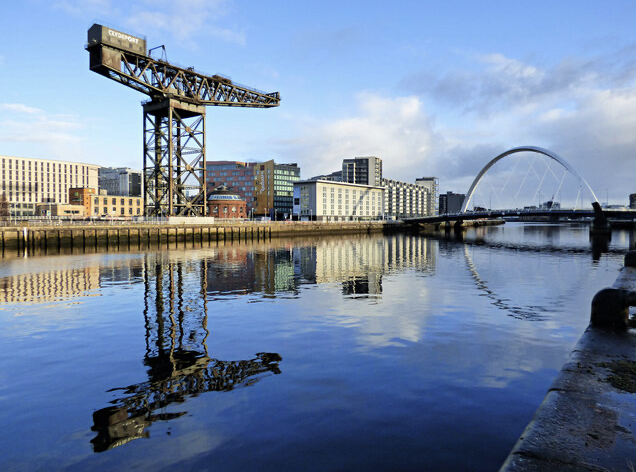

As I ran over one of the bridges to track north-side to then cross south again at what’s known colloquially as Squinty or the Clyde Arch (seen right), I noticed that the flow of the river was seemingly unending. The ripples on the surface, illuminated by the lights of the STV and BBC buildings, highlighted the myriad of influences: from the wind, the barriers in the river for the bridge, and the boats moored alongside. It still flowed onwards, regardless of what was happening on the bridge, those who were out (very) early on their way to work (or running). We can also recall when possibly the Clyde and definitely smaller rivers can freeze over completely. The surface then does not show any of the flow of the river but still it continues to do so – it does not stop, cease to flow.
The church could be seen in a similar way. For many today, the church is one that seamlessly flows alongside their lives, and rarely do the two impact upon each other.
They can look onto the church and its ways and see some of the ripples: the work it is doing with addictions, providing warm spaces, food banks, and trying to be a focal point for community; nevertheless, it can just walk on by.
We might also see the church as one that is frozen over: it seems unable to move forwards, seemingly held back by the fingers of ice which claw tightly to the river, denying it progress. However, it is still flowing.
We are in that flowing river, we are the ones, not trapped, but doing our best to provide for those that need, in any way possible. Whether it is providing that warm welcome to a group that attends the church, for we are more than a facility that lets our rooms; meeting someone along the road and greeting them because there appears to be something wrong; being a presence at a bed side if someone is ill; and/or listening to those who have no voice in our world – we are part of that flowing river: maybe unnoticed but certainly present.
As we seek to follow God’s path in our lives, I’m reminded – I have been since arriving in Scotland – of the Aberdonian evangelist Oswald Chambers who said: “God does not exist to answer our prayers, but by our prayers we come to discern the mind of God.” As a Circuit, District and even the Methodist Connexion, we are seeking that mind of God, to discern which path we need to flow along.
It may mean that we need to create extra tributaries, rivulets of God’s love, which flow to particular groups of people, may be even some of whom we are unaccustomed to being with. The river that we have grown attached to for so many decades may well start to meander in different directions – rivers do, especially as they get nearer to the coast. They spread out into deltas, and they offer liberating water to a greater number of communities spread out over a greater area.
We may need, due to numbers, to prioritise that flow, but change may be necessary.
I read recently of one church, in the US, that wanted to desperately keep the use of its ancient hymnal. When they asked those who did venture into their church what struck them as odd, it was the use of such an old hymn book. The members stood their ground for they had become so used to that form of music; the numbers attending dropped further. Those that had left had struggled with the words and phrases that had lost their meaning in today’s society. It is a lingering thought of what might hold us back as we wend our way onwards.
The words which came to me on the start of my ministry journey was to “go where the people are”. To be part of where they were, not to pull them back into the safety of the sanctuary. If Jesus keeps speaking about finding heaven on earth, let’s go out looking, daring to glimpse, hoping to find, wanting to experience what heaven is like now. And I have so often found that with those unable to worship together in mainstream churches as they identified as LGBT, with those who felt uncomfortable in traditional worship but desired to really engage with what the Bible has to say about topics in their life, and with those in addiction but sought the help and support of their higher power.
I recall a question posed many moons ago: how does a group of people show what church is like? For some they formed a circle and held hands; for some they turned outwards and then held hands; and for some, they were off out of the door to find where God was leading them.
Where does that take us today? We have that opportunity to be the change, not just ‘in church’ but in our life – regardless of how old you might be feeling! Change can be painful, but it can also be liberating. The new followers of Jesus, more so after the resurrection, experienced such a transformational change in their understanding worship, and practice of their faith. From being exclusive to being totally inclusive, from formal practices to that desire to know God more and more. We can meet change like that as well. I have learnt that situations can cause both anxiety and excitement : choose excitement and go with the change.
Do you agree?
The dialogue is so enjoyable I love it